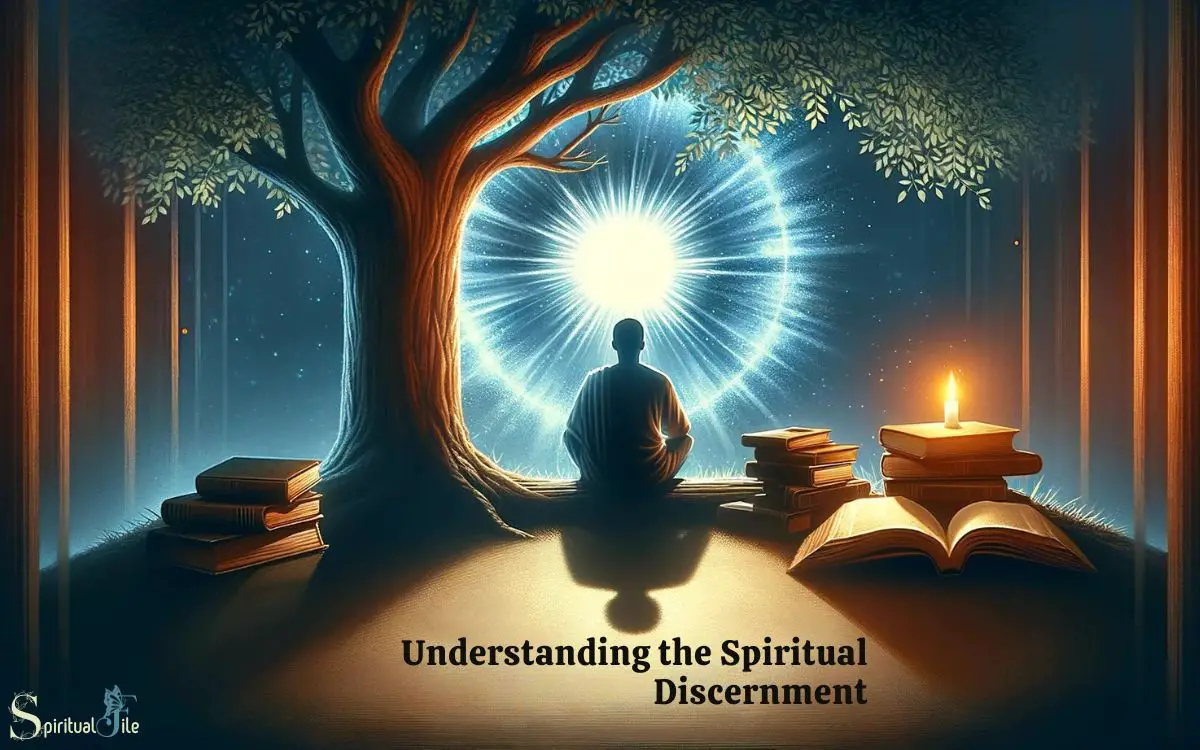He That Is Spiritual Judgeth All Things: Explanations!
Understanding spiritual discernment is like developing a finely-tuned instrument, capable of delicately detecting the nuances of truth and morality.
As I explore the concept of “He That Is Spiritual Judgeth All Things,” I find myself drawn to the profound role of judgment in spirituality.
Through this exploration, I aim to illuminate the application of spiritual insight in our daily lives and its profound impact on our relationships.
Join me in this journey of nurturing and refining our spiritual discernment, as we seek to grasp the depth of its influence and the responsibility it bestows upon us.

Key Takeaway
Understanding the Spiritual Discernment

As a spiritual person, I have come to understand the importance of developing a keen sense of spiritual discernment. Spiritual discernment is the ability to perceive and understand the spiritual forces at work in the world and in our lives.
It involves not only recognizing the presence of spiritual influences but also distinguishing between the true and the false, the good and the evil.
This discernment is crucial for making sound decisions, avoiding deception, and staying aligned with divine truth.
In the realm of theology, the concept of spiritual discernment is deeply rooted in the belief that humans are engaged in a spiritual battle between light and darkness.
Therefore, cultivating this discernment is essential for navigating this cosmic conflict and living a life in accordance with divine will.
The Role of Judgment in Spirituality

As we consider the role of judgment in spirituality, it is essential to explore the relationship between spiritual discernment and judgment. Balancing the act of judgment with compassion is a crucial aspect of navigating spiritual matters.
Additionally, we must examine how spiritual judgment can facilitate personal and communal growth within a spiritual context.
Spiritual Discernment and Judgment
Understanding the role of judgment in spirituality involves discerning the alignment of actions and attitudes with spiritual principles. Spiritual discernment and judgment play a crucial role in guiding believers on the path of righteousness and truth.
Here are four key aspects to consider:
- Scriptural Alignment: The foundation of spiritual discernment lies in comparing thoughts, actions, and beliefs with the teachings of sacred texts.
- Inner Guidance: Seeking the guidance of the Holy Spirit or inner divine wisdom to discern the truth and make righteous judgments.
- Fruit Inspection: Evaluating the fruits of one’s actions and the impact they have on oneself and others as a gauge of spiritual alignment.
- Community Accountability: Engaging in respectful dialogue and accountability within the spiritual community to ensure judgments are aligned with love and truth.
Balancing Judgment and Compassion
How can I effectively balance judgment and compassion in my spiritual journey? This question is at the heart of the human experience and is especially pertinent in matters of spirituality.
In the context of spirituality, judgment and compassion are not necessarily opposing forces; rather, they can be seen as complementary aspects of a holistic approach to understanding and interacting with the world.
The role of judgment in spirituality involves discernment, wisdom, and the ability to differentiate between right and wrong.
However, it is crucial to temper judgment with compassion, empathy, and understanding. Balancing judgment and compassion requires a deep understanding of one’s own beliefs and values, as well as a willingness to see the humanity in others.
It involves striving for fairness and justice while also recognizing the inherent dignity and worth of every individual.
Growth Through Spiritual Judgment
Navigating the role of judgment in spirituality involves cultivating discernment, fostering wisdom, and embracing the challenges and growth opportunities that arise.
When considering the growth through spiritual judgment, it is essential to recognize the following:
- Self-Reflection: Engaging in introspection allows for a deeper understanding of one’s own thoughts and intentions, fostering personal growth and spiritual development.
- Accountability: Embracing the role of judgment involves being accountable for our actions and decisions, leading to greater self-awareness and alignment with spiritual principles.
- Learning from Mistakes: Acknowledging and learning from our mistakes is crucial for spiritual growth, as it allows for the development of humility and empathy towards others.
- Seeking Guidance: Seeking guidance from spiritual mentors and engaging in open dialogue with fellow believers can provide valuable insights and perspectives, contributing to personal and communal spiritual growth.
Applying Spiritual Insight to Daily Life

As spiritual beings, it is essential to explore the practical application of spiritual insight in everyday life.
Integrating spiritual wisdom into daily challenges can provide a deeper understanding of our experiences and relationships. This integration can help us navigate life’s complexities with a sense of purpose and clarity.
Integrating Spiritual Wisdom
Integrating spiritual wisdom involves consistently applying spiritual insight to daily life, enabling a deeper understanding of the interconnectedness of all things. This integration is crucial for personal growth and a harmonious existence within the universe.
To effectively integrate spiritual wisdom:
- Reflection: Regular introspection allows for the examination of one’s thoughts, actions, and intentions in light of spiritual principles.
- Mindfulness: Being present in each moment fosters a heightened awareness of the spiritual significance inherent in daily experiences.
- Compassion: Actively expressing empathy and kindness towards others aligns with the core tenets of many spiritual traditions.
- Service: Engaging in selfless service to uplift and support others embodies the application of spiritual wisdom in practical ways.
Navigating Daily Challenges
Continuing from the previous subtopic, I find that regularly reflecting on my thoughts and actions in light of spiritual principles helps me navigate daily challenges with clarity and purpose. When faced with difficult decisions or trying circumstances, I often turn to the teachings of my faith for guidance.
This practice not only provides me with a sense of inner peace but also equips me with the wisdom to address daily issues in a manner that aligns with my spiritual beliefs.
For instance, when encountering conflict, I rely on the principles of forgiveness and empathy to foster resolution and understanding.
Discerning Truth and Morality

One key aspect of discerning truth and morality is recognizing the impact of personal biases on judgment.
As individuals, our upbringing, experiences, and cultural influences shape our perspectives. In the pursuit of truth and morality, it is crucial to acknowledge and address these biases.
This can be achieved through:
- Self-reflection: Taking the time to critically assess our own beliefs and values.
- Seeking diverse perspectives: Actively engaging with individuals from different backgrounds and ideologies.
- Evaluating sources critically: Scrutinizing the information we receive to discern fact from opinion or misinformation.
- Considering ethical principles: Reflecting on how our decisions align with universal moral standards and principles.
Nurturing Spiritual Discernment in Practice

Navigating spiritual discernment in practice requires a continuous effort to recognize and address personal biases while actively seeking diverse perspectives.
It is essential to cultivate a mindset that acknowledges the limitations of individual understanding and embraces the wisdom found in various theological traditions and perspectives.
Engaging in regular spiritual disciplines such as prayer, meditation, and studying sacred texts can enhance the sensitivity to spiritual discernment.
Additionally, fostering genuine relationships with mentors and peers who embody spiritual maturity and wisdom can provide valuable guidance and accountability in discerning spiritual matters.
Furthermore, humility plays a pivotal role in nurturing spiritual discernment, as it allows for openness to correction and growth.
Ultimately, actively nurturing spiritual discernment in practice demands a commitment to ongoing self-reflection, learning, and a willingness to engage with differing viewpoints.
The Impact of Spiritual Judgment on Relationships

In my experience, spiritual judgment significantly influences the dynamics of relationships.
Through my theological lens, I have observed the following impacts:
- Clarity: Spiritual judgment brings clarity to the intentions and motivations of individuals within a relationship, allowing for a deeper understanding of their actions and words.
- Alignment: It helps in aligning values and beliefs, creating a common ground for mutual growth and support within the relationship.
- Resolution: When conflicts arise, spiritual judgment can guide individuals to seek resolution through forgiveness, empathy, and understanding, fostering healthier and more enduring relationships.
- Boundaries: It aids in establishing healthy boundaries and discerning when to invest in, sustain, or gracefully release relationships that no longer align with one’s spiritual journey.
These observations highlight the profound impact of spiritual judgment on the dynamics and sustainability of relationships.
Can Spiritual Judgment Help in Seeing Spiritual Things?
Spiritual judgment plays a crucial role in understanding spiritual vision explanations. By tapping into our inner wisdom and intuition, we can open our minds to the deeper meanings behind spiritual experiences. With a discerning approach, we can gain valuable insights into the mysteries of the spiritual realm.
To the Spiritual All Things Are Spiritual

The statement “To the spiritual, all things are spiritual” reflects a perspective often associated with certain spiritual or philosophical beliefs.
This concept suggests that those with a deep spiritual awareness or understanding see the spiritual dimension in everything around them, including the physical world and everyday experiences.
Here’s a brief explanation:
Pantheism: Some spiritual or philosophical traditions, like pantheism, view the entire universe as divine or spiritual in nature.
In this worldview, there is no strict separation between the material and the spiritual; everything is interconnected and part of a greater whole.
Spiritual Awareness: Individuals who have developed a heightened sense of spiritual awareness may perceive spiritual significance in ordinary events, objects, or experiences.
This perspective can lead to a greater sense of interconnectedness and a feeling that everything has a deeper meaning or purpose.
Transcendence: For some, spirituality involves transcending the boundaries of the physical world and connecting with a higher or divine realm.
In this context, all things are seen as part of a larger spiritual reality, and the material world is just one expression of this spiritual essence.
It’s important to note that this perspective may vary depending on one’s specific spiritual beliefs or philosophical outlook.
Not everyone subscribes to this idea, and different cultures and belief systems have their own interpretations of the relationship between the spiritual and the material.
Conclusion
The practice of spiritual discernment is essential for navigating life’s complex moral and ethical dilemmas. By honing our ability to judge with spiritual insight, we can better understand truth, morality, and our relationships with others.
The impact of spiritual judgment on our daily lives cannot be understated, and the cultivation of this skill is an ongoing journey that holds great potential for personal growth and understanding.






